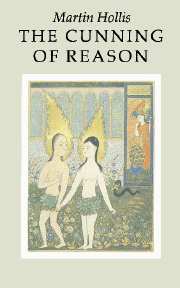Book contents
- Frontmatter
- Contents
- Preface
- 1 The sovereign artificer
- 2 Rational choice
- 3 Norms and institutions
- 4 The Cunning of Reason I: unintended consequences
- 5 Motivation
- 6 External and internal reasons
- 7 Rational Expectations
- 8 Maximising and satisficing
- 9 The Cunning of Reason II: functions and rules
- 10 Reasons and roles
- 11 Rationality and understanding
- 12 The Cunning of Reason III: self and society
- Bibliography
- Index
- Frontmatter
- Contents
- Preface
- 1 The sovereign artificer
- 2 Rational choice
- 3 Norms and institutions
- 4 The Cunning of Reason I: unintended consequences
- 5 Motivation
- 6 External and internal reasons
- 7 Rational Expectations
- 8 Maximising and satisficing
- 9 The Cunning of Reason II: functions and rules
- 10 Reasons and roles
- 11 Rationality and understanding
- 12 The Cunning of Reason III: self and society
- Bibliography
- Index
Summary
One merit of an economic notion of rational choice is that it generates subtle, elegant and powerful theorems from very simple assumptions. The theorems fill fat volumes which witness to the claim of neo-Classical economics to be the most theoretically advanced of the social sciences. The assumptions take only a couple of pages at the start of such works and are often so sketchily stated that they seem uncontroversial. Yet more hangs on them than the advanced technicalities of economics. A further merit of an economic notion of rational choice is that it can be applied in other social sciences, where it offers to ground a complete theory of social action and even of social institutions. There are, for instance, ‘economic’ theories of democracy, friendship, international policy, kula rings, marriage and race relations. These are certainly controversial and raise questions about the assumptions, which also echo doubts about neo-Classicism to be heard within economics itself. So it is worth taking extreme care over the exact assumptions.
I approach the task as a philosopher with warm respect for the technical expertise which economists have and I do not. Respect will take the form of avoiding some hard questions which arise at points where technical supporting theories need to be plugged into the basic model of rational choice before the advanced theorems can be derived. There are, for example, philosophical queries to raise in econometrics, but only if one knows one's way about. The basic assumptions, however, are fair game for anyone, and it soon emerges that they are philosophically charged.
- Type
- Chapter
- Information
- The Cunning of Reason , pp. 15 - 28Publisher: Cambridge University PressPrint publication year: 1988



